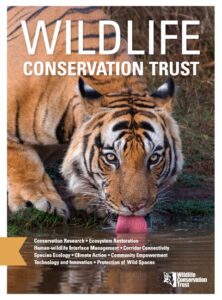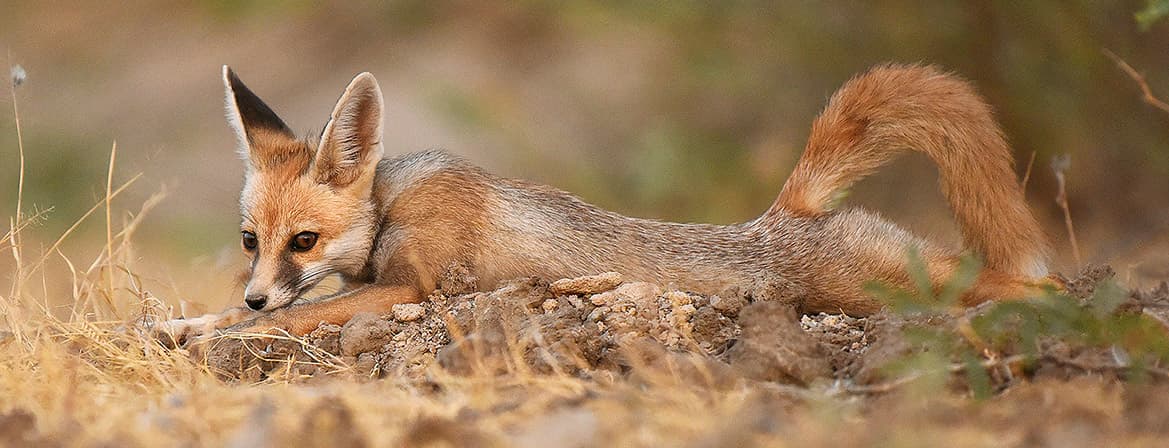The Wildlife Conservation Trust (WCT) was founded to safeguard India’s life-giving ecosystems in a holistic, sustainable manner. Recognising the interconnectedness between people and ecosystems, WCT uses a 360° approach to conservation by placing equal emphasis on both forest and wildlife conservation and community development. We work closely with Forest Departments across the country to fortify on-ground protection by training and equipping frontline forest staff. We collect scientific data from the ground to understand conservation needs and devise robust, scalable solutions. Through partnerships with a multitude of sectors including business houses, the Trust is attempting to mitigate human-wildlife conflict and also provide alternatives to fuelwood to reduce the anthropogenic pressure on natural ecosystems and fight forest degradation.
The idea is simple—secure key wildernesses to safeguard wildlife, people and rivers, and mitigate climate change.
Using the Tiger as a metaphor for all of nature, WCT was envisioned to preserve and protect India’s rich natural heritage. Currently, WCT works in and around 160 Protected Areas across 23 states and four Union Territories in the country covering 79 percent of India’s tiger reserves, 24 percent of the national parks and sanctuaries and impacting a population base of approximately 3.5 million people.
WCT’s core areas of work include application of conservation methodologies on the ground; long-term conservation research; understanding behaviour of people who live in and around forests to understand the inter-relation between them and the natural ecosystems; human-wildlife interface management; conducting scientific studies to suggest mitigations on linear infrastructure passing through wildlife corridors; building capacity of the Forest Department in wildlife law enforcement and forensics; health of frontline forest staff; and road ecology. We team up with state Forest Departments to assess the protection mechanism of tiger reserves, and fill the gaps by donating essential equipment, building capacity in the frontline forest staff, conducting health check-ups for the forest staff and providing training in managing medical emergencies.
We believe that healthy natural ecosystems and engaged, empowered communities are the bedrock of economic growth. We remain committed to conserving India’s wildlife for posterity and working towards sustainable development of the communities that share their space with wildlife such as tigers, Asiatic lions, leopards, Asian elephants, Gangetic dolphins and gharial.
Over the years, WCT has grown into a think tank for state Forest Departments and other government agencies. We are a team of scientists, conservationists, economists, legal and forensic experts, analysts, medical doctors, social psychologists, educationists, social workers and communicators who are deeply involved in developing sound strategies and long-term solutions to myriad conservation issues. This is achieved through robust collaborations – national and international – with government bodies, NGOs, research institutions and individuals.
Organisation Highlights:
- In a decade, we have worked in and around 160 Protected Areas through our conservation efforts.
- WCT is the only non-governmental organisation conducting large-scale tiger population estimation exercise in wildlife corridors and habitats outside Protected Areas.
- WCT has played or continues to play a pivotal role as a member to:
- The advisory board, Global Tiger Forum
- The advisory board, National Tiger Conservation Authority
- State Boards of Wildlife – Maharashtra, Madhya Pradesh, Rajasthan and Jammu & Kashmir
- Executive Committee of the Madhya Pradesh Tiger Foundation Society
- Executive Committee of the Gujarat State Lion Conservation Society (GLCS)
- Executive Committee of the Village Social Transformation Foundation, set up by Government of Maharashtra.
- Organising Committee of the Indian Climate Collaborative
- Member of Maharashtra Coastal Zone Management Authority
- Member of International Union for Conservation of Nature (IUCN)
- WCT regularly participates in the All India Tiger Population Estimation exercise conducted by the NTCA.
- Over 19,000 forest staff trained in effectively implementing the Wild Life (Protection) Act, 1972, through our wildlife law enforcement training exercises.
- WCT’s model involving environmentally sustainable and energy efficient biomass-fired water heaters designed to drastically reduce firewood usage for water heating with the aim of arresting forest degradation, has been accepted widely and the project is being replicated and scaled up with the help of different state governments.
- WCT’s ‘Caring for Conservators’ health programme for the frontline forest staff has reached to over 18,700 forest guards and watchers through preventive health assessments.
- We have effectively trained over 4,500 forest staff in Trauma Management to enhance their safety in the field.
- WCT is the first organisation in the sub-continent to carry out radio-telemetry studies on the critically endangered Indian pangolin and Eurasian otter to understand their ecology and eventually help in its long-term conservation.
WCT Brochure

WCT plays a catalytic role in the landscapes it operates in. Our focus is on strengthening sustainable ecosystems that will continue to serve wildlife and communities in the long-term. To achieve this, we work closely with government bodies and local NGOs, providing funding, technical support and consultancy. The solutions we create are rooted in hard science and are easily replicable.
Wildlife Conservation Trust, a non-governmental organization established in the year 2002 in Mumbai as a Public Charitable Trust. WCT is also registered under Foreign Contribution Regulation Act 2010 (FCRA) having registration number 083781356 dated 08.01.2013.
Header image © Dr. Anish Andheria
Your donations support our on-ground operations, helping us meet our conservation goals.
Related Links
- Reinforcing Protection
- One Health
- World Wildlife Day 2019 – Life below water
- Conservation Strategy
- Tiger Matters – A Documentary on our 360 Degree Approach to Conservation
- In Mumbai, Leopards are Citizens Too

